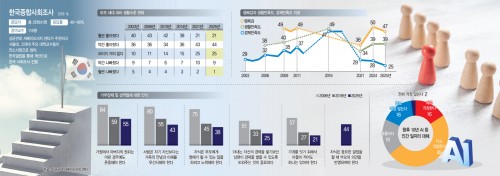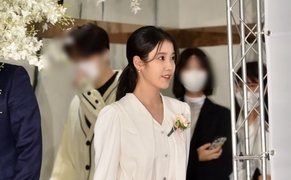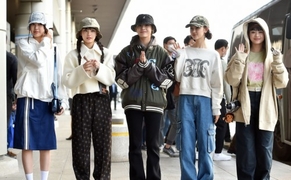 |
South Korean society has undergone profound transformations over the past two decades, with traditional Confucian hierarchies giving way to stronger notions of individuality and personal freedom. Yet, even as material satisfaction declines, psychological stability and altruism remain important values — while anxiety about artificial intelligence (AI) and job security is on the rise.
From Confucian order to individual choice
According to the 2025 Korea General Social Survey (KGSS), only 55% of respondents now agree that “a father’s authority should always be respected,” down sharply from 84% in 2006. Similarly, agreement with statements such as “the family’s well-being must come first” (down from 80% to 43%) and “children should bring honor to their parents” (75% to 38%) has nearly halved, signaling a decisive break from the patriarchal and hierarchical norms that once defined Korean society.
The shift is especially clear in gender roles. Support for the idea that “a son should carry on the family line” fell from 57% to 21%, while those agreeing that “a wife’s role is to support her husband’s career” declined from 51% to 25%. More than two-thirds (71%) of respondents said they consider premarital sex acceptable — up from 50% in 2008 — underscoring a broader social liberalization.
However, conservative attitudes persist in certain areas: 70% still view same-sex relationships negatively, and approval of extramarital affairs remains in the low teens, even after the 2016 abolition of the adultery law. Analysts describe this as a “transitional phase,” with liberal and traditional values coexisting uneasily.
Economic discontent, emotional resilience
Economic satisfaction has dropped to its lowest point in two decades (25%), but levels of happiness (47%) and life satisfaction (39%) have remained steady. Experts suggest that emotional well-being increasingly stems from social relationships and psychological stability rather than material prosperity.
Still, pessimism about social mobility is spreading. Many Koreans now believe success depends more on family background and parental education than on personal effort — a reflection of the waning “rags-to-riches” dream once symbolized by the saying “a dragon rising from the mud.”
Meanwhile, public support for welfare spending on pensions and unemployment benefits has fallen, though spending on environmental (61%) and health (53%) issues continues to draw strong backing.
AI: convenience meets insecurity
AI and automation have emerged as defining forces of modern Korean life, bringing both convenience and unease. The survey found that 65% of respondents worry that automation will replace human jobs, while only a small minority said they were “not worried at all.”
Yet attitudes toward technology in daily life were largely positive. Nearly half of respondents said they would feel comfortable undergoing surgery performed by a robot (46%) or riding in a self-driving car (45%), suggesting growing acceptance of AI’s practical benefits.
At the same time, 53% expressed concern over the reliability of AI-generated information, and many said they struggle to distinguish between content created by humans and that produced by machines.
Analysts say the findings reflect a society caught between the promise of technological progress and the fear of social disruption. While AI offers efficiency and convenience, it also raises urgent questions about employment, trust, and the meaning of work in an increasingly automated world.
Conducted by the Sungkyunkwan University Survey Research Center with support from the National Research Foundation of Korea, the KGSS has tracked shifts in Korean social values since 2003 in partnership with major universities including Seoul National, Yonsei, and Korea University.
Most Read
-
1
-
2
-
3
-
4
-
5
-
6
-
7





















